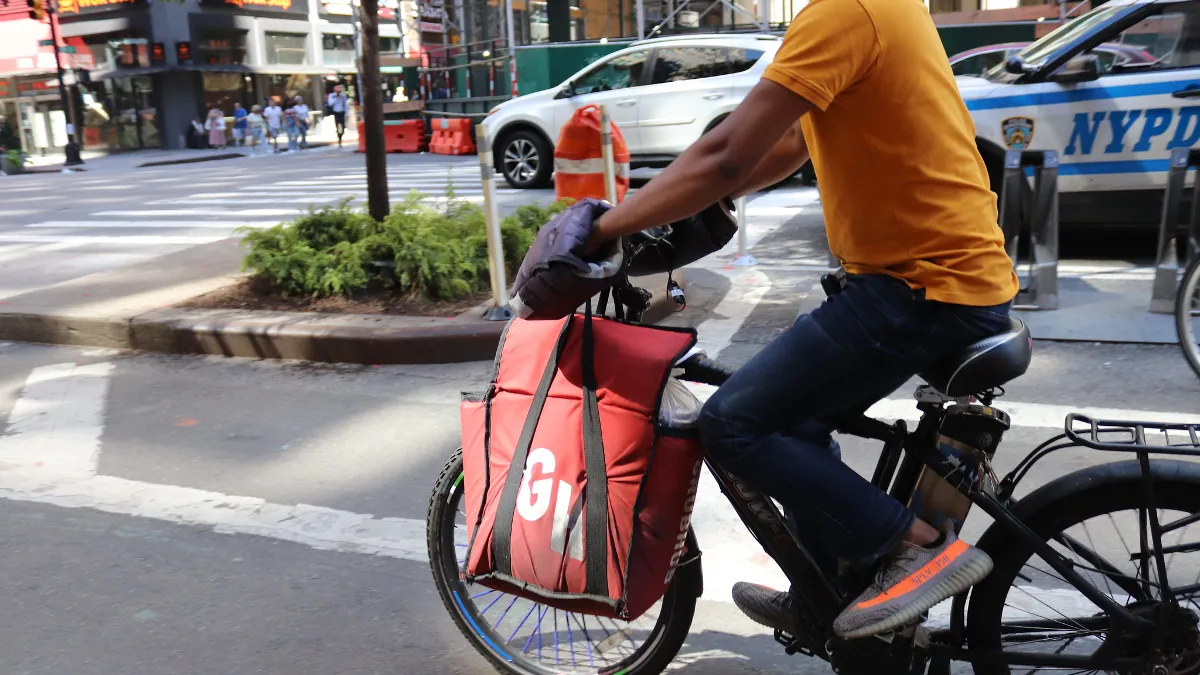Dive Brief:
- Los Angeles County sued Grubhub over a number of business practices it deems deceptive in the California Superior Court for the County of Los Angeles on Wednesday, court records show.
- LA County specifically cited Grubhub’s alleged practice of misrepresenting delivery fees; advertising free online ordering; using of its driver support fee to subsidize a benefit for which most workers are ineligible; ordering search results based on a merchant’s marketing spend without disclosure; and granting refunds to consumers without notifying restaurants, even when restaurants are not responsible for problems with the order.
- The suit asks for an injunction against those alleged tactics and for Grubhub to pay restitution and pay $2,500 in fines for every time it violated the state’s unfair competition laws and false advertising laws. In addition, it calls for Grubhub to pay a further $2,500 for each instance its alleged violations of the unfair competition statutes impacted a senior citizen or disabled person.
Dive Insight:
LA County alleges the company was showing consumers advertisements that promised free online ordering before charging them fees at checkout. Grubhub said in a statement emailed to Restaurant Dive that the practice in question has been discontinued and that it is removing all language referring to free online ordering from its marketing. The company claims that it adequately discloses fees prior to purchase.
The suit alleges Grubhub would show customers a flat fee for a delivery order, before tacking on significant fees at the end of the order. Grubhub claimed it did not misrepresent those fees and that it disclosed the possibility of charging fees during the ordering and checkout process in its terms of service. The company will add a link with additional fee disclosures on Grubhub restaurant menus in LA County, according to the statement emailed to Restaurant Dive.
A Grubhub spokesperson said the aggregator complies with existing law and is “disappointed Los Angeles County has moved forward with this lawsuit and plans to aggressively defend our business in court.”
Grubhub further said that restaurant placement in search results was driven by a variety of factors, but that marketing spend “only impact[s] search results for restaurants in Los Angeles in certain, limited circumstances.”
The suit argues, by contrast, that “taking restaurant marketing commissions into account in its search rankings reduces the utility of Grubhub’s search function for consumers seeking the best match for their search queries.”
The company doesn’t feel its language relating to the driver benefits fee is misleading, either. That fee, according to the lawsuit, is presented as paying for “healthcare benefits for our drivers so they don’t have to depend on tips.” However, a majority of drivers are ineligible for the subsidy, which is paid at the end of each quarter as a form of reimbursement for health insurance costs. The suit argues that this language, coupled with changes to tipping policy, eroded driver earnings.
The suit also alleges that the delivery company routinely passed the cost of refunds on to restaurants by issuing refunds without notifying them. Grubhub said it updated its refund policy in 2023 to make it easier for restaurants to dispute refunds, and that it has discontinued its practice of unilaterally offering refunds.
“Our lawsuit seeks to hold Grubhub accountable for their unfair and deceptive business practices that deceive and overcharge consumers, exploit drivers, and unfairly short-change restaurants on order refunds," County Counsel Dawyn Harrison said in a statement announcing the suit.
Cities have begun to increase regulatory scrutiny of the business practices of gig economy firms. Last year, Grubhub paid $3.5 million to settle a similar, but fee-specific, lawsuit in Washington, D.C. In January, the Massachusetts attorney general secured a $3.5 million settlement with Grubhub over junk fees. The Federal Trade Commission, in its proposed rule eliminating or reducing many kinds of junk fees, cited the Washington, D.C. Grubhub case and specifically targeted the fees charged by restaurant delivery companies if portions of the fees charged are used to cover costs and to support drivers.















